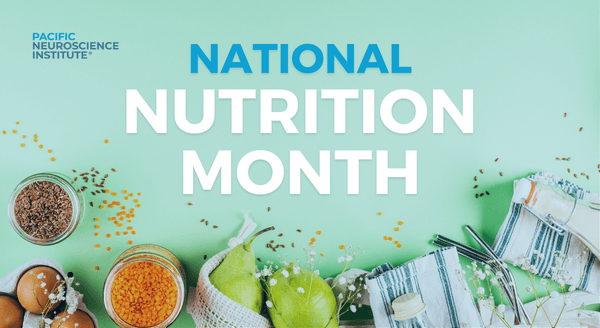
How a Low-Carb Diet Could Slow Alzheimer’s Disease Progression
by Jennifer Bramen
Are you concerned about Alzheimer’s disease (AD) and looking for ways to safeguard your brain health? Traditional treatments have their limits, but what if the key to slowing down AD lies in your diet? We’ve conducted research aimed at exploring the potential benefits of a carbohydrate-restricted diet for AD patients, and the findings are promising. This diet is lower in carbohydrates than the Standard American Diet, but not so low in carbohydrates that you need to eliminate your favorite foods.
Carbohydrates and Alzheimer’s Disease
Before we dive into the study’s findings, it’s important to understand the connection between carbohydrates and AD. Brain cells depend on insulin to use glucose effectively. When insulin resistance sets in, as it often does with older age and AD, it can lead to cognitive decline. Both AD and type 2 diabetes share common mechanisms, including impaired insulin signaling. Lowering blood sugar and insulin levels could also help clear harmful Aβ peptides (amyloid buildup) that contribute to AD. Eating fewer carbohydrates results in lower overall blood sugar.
The Study
In our paper titled “Impact of Eating a Carbohydrate-Restricted Diet on Cortical Atrophy in a Cross-Section of Amyloid Positive Patients with Alzheimer’s Disease: a Small Sample Study,” we divided AD patients with confirmed amyloid burden into two groups: those on a low-carb diet (the lower carb group) and those on a moderate-to-high carb diet.
A Thicker Cortex
Participants in the lower carb group had thicker cortex regions in primary and secondary visual and somatomotor networks. This means their brains showed less thinning, a hallmark of AD. Even after accounting for factors like age, sex, education, and BMI, these differences held.
Continuous Benefits?
We also explored the relationship between carb intake and cortical thickness on a continuum. The results were even more impressive. The lower the carb intake, the thicker the cortex, particularly in the frontoparietal, cingulo-opercular, and visual networks. These are crucial brain regions for memory and cognitive function, and they seemed to be healthier when participants ate generally less carbs.
What It Means
In essence, our study suggests that a carbohydrate-restricted diet, with daily intake under 130 grams of net carbohydrates, may help preserve brain health in AD patients. The brains of those following this diet appeared more resilient, especially in areas associated with AD. While it’s not a cure, it’s a promising avenue for slowing down the disease’s progression. A carbohydrate-restricted diet, particularly one following the brain-healthy MIND diet guidelines, might offer hope in the fight against cognitive decline.
A Note of Caution
It’s important to acknowledge the limitations of our study. The sample size was small, and the participants were primarily well-educated, which could limit generalizability. We also relied on self-reported dietary information, and our study was cross-sectional (the outcome and the exposures are measured at the same time). More research is needed with larger groups and longer timeframes.
Supporting Change
To achieve optimal outcomes, consider professional support. Making changes to your eating habits can be daunting, and health coaches can break these into small, achievable steps. If you are curious, consider contacting Dr. Karen Miller, Senior Director of the Brain Wellness & Lifestyle Program at Pacific Neuroscience Institute®(PNI®) in Santa Monica. Her team of coaches can create a custom plan to improve your brain health through diet and other brain healthy habits.
How to Enroll in the Brain Wellness & Lifestyle Program
Virtual and in-person sessions are available. To learn more about participation, contact us: lifestyle@pacificneuro.org | 213-344-2037
Useful Links
Related Videos
 Lifestyle Program at PNI
Pacific Neuroscience Institute’s new Lifestyle Program offers a multimodal education approach to optimize brain wellness. Whether you aim to enhance your longevity, stabilize cognitive decline, or receive support after a…
Lifestyle Program at PNI
Pacific Neuroscience Institute’s new Lifestyle Program offers a multimodal education approach to optimize brain wellness. Whether you aim to enhance your longevity, stabilize cognitive decline, or receive support after a…
 Why You Should Eat Tomatoes in September
Did you know that September is the perfect time to enjoy peak season tomatoes? Lycopene, the most abundant carotenoid in ripened tomatoes, is an antioxidant that fights against inflammation and…
Why You Should Eat Tomatoes in September
Did you know that September is the perfect time to enjoy peak season tomatoes? Lycopene, the most abundant carotenoid in ripened tomatoes, is an antioxidant that fights against inflammation and…
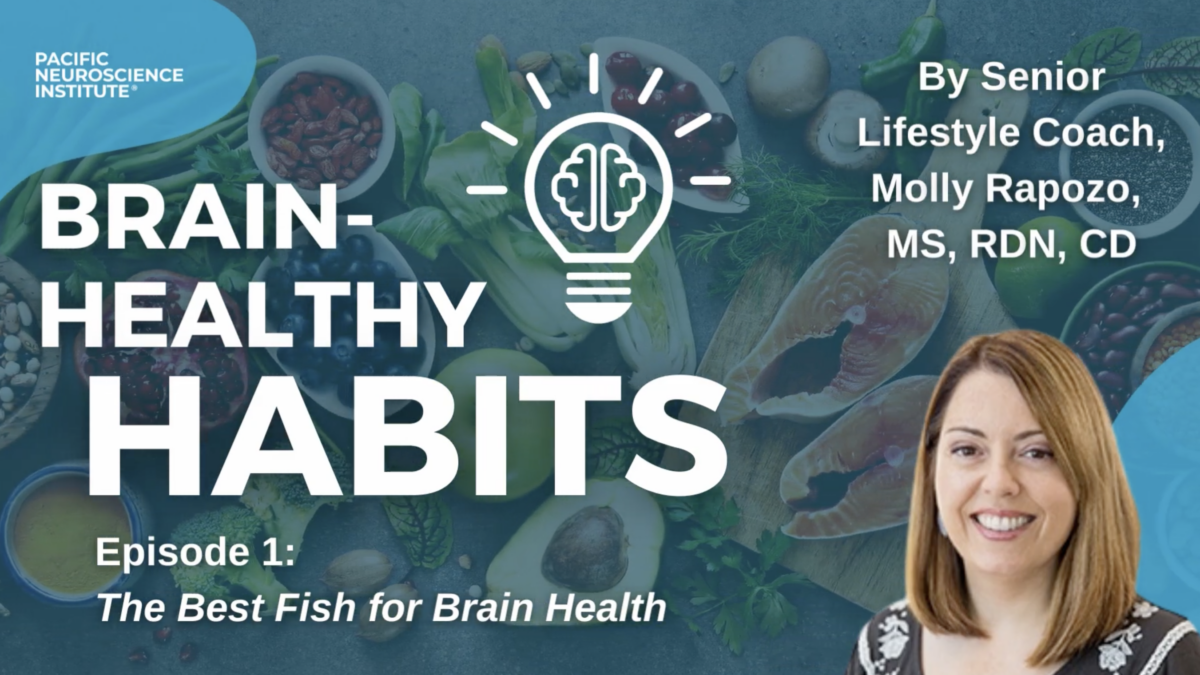 Brain-Healthy Habits Episode 1: The Best Fish for Brain Health
Brain-Healthy Habits Episode 1: The Best Fish for Brain Health
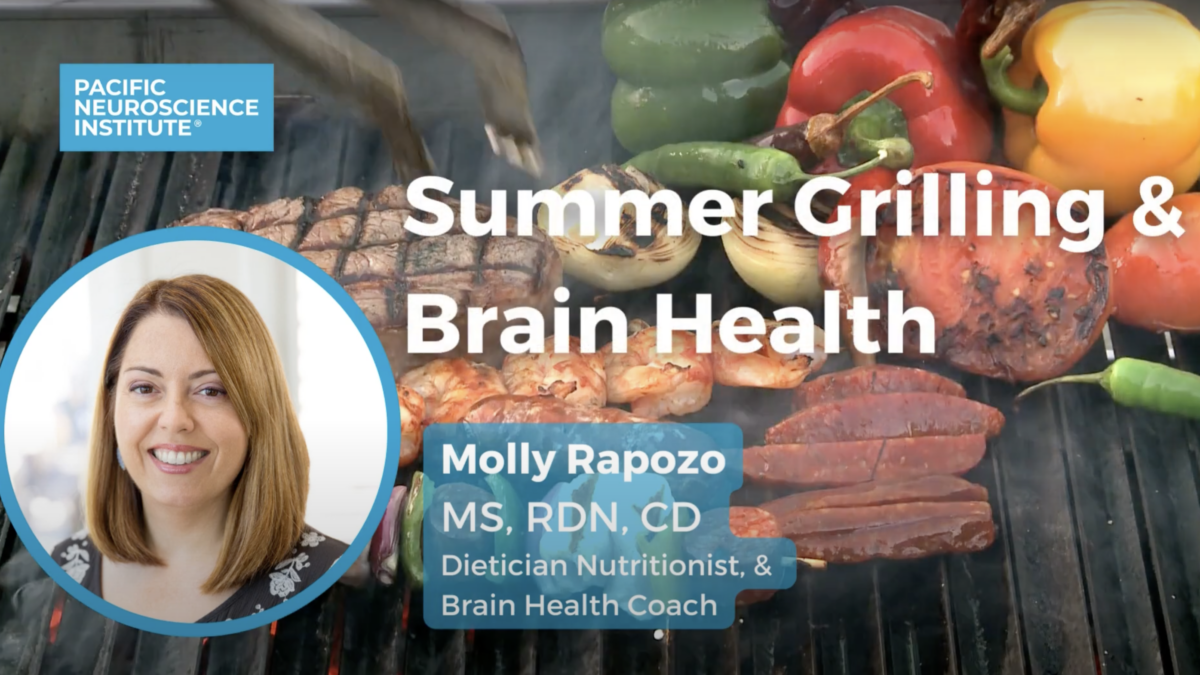 Summer Grilling and Brain Health. What are AGEs? with Molly Rapozo | A PNI Minute
Molly Rapozo, MS, RDN, CD, Registered Dietician Nutritionist and Brain Health Coach at the Pacific Brain Health Center discusses how to avoid advanced glycatin end-products (AGEs) from grilled and barbequed…
Summer Grilling and Brain Health. What are AGEs? with Molly Rapozo | A PNI Minute
Molly Rapozo, MS, RDN, CD, Registered Dietician Nutritionist and Brain Health Coach at the Pacific Brain Health Center discusses how to avoid advanced glycatin end-products (AGEs) from grilled and barbequed…
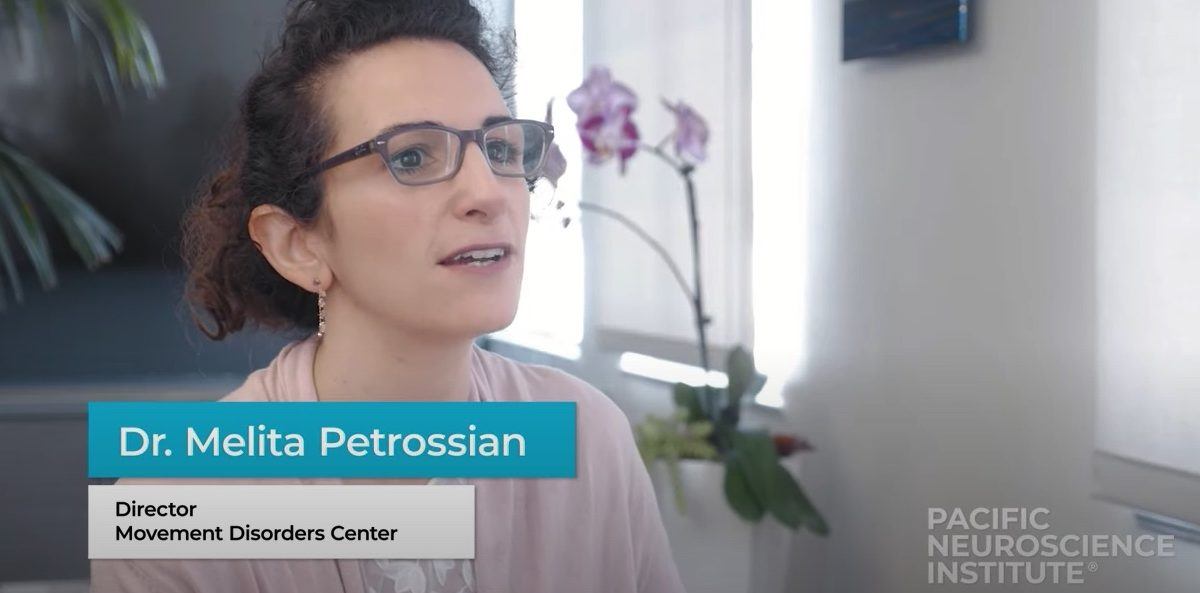 A PNI Minute | The MIND Diet for Parkinson’s Disease
A PNI Minute | The MIND Diet for Parkinson’s Disease
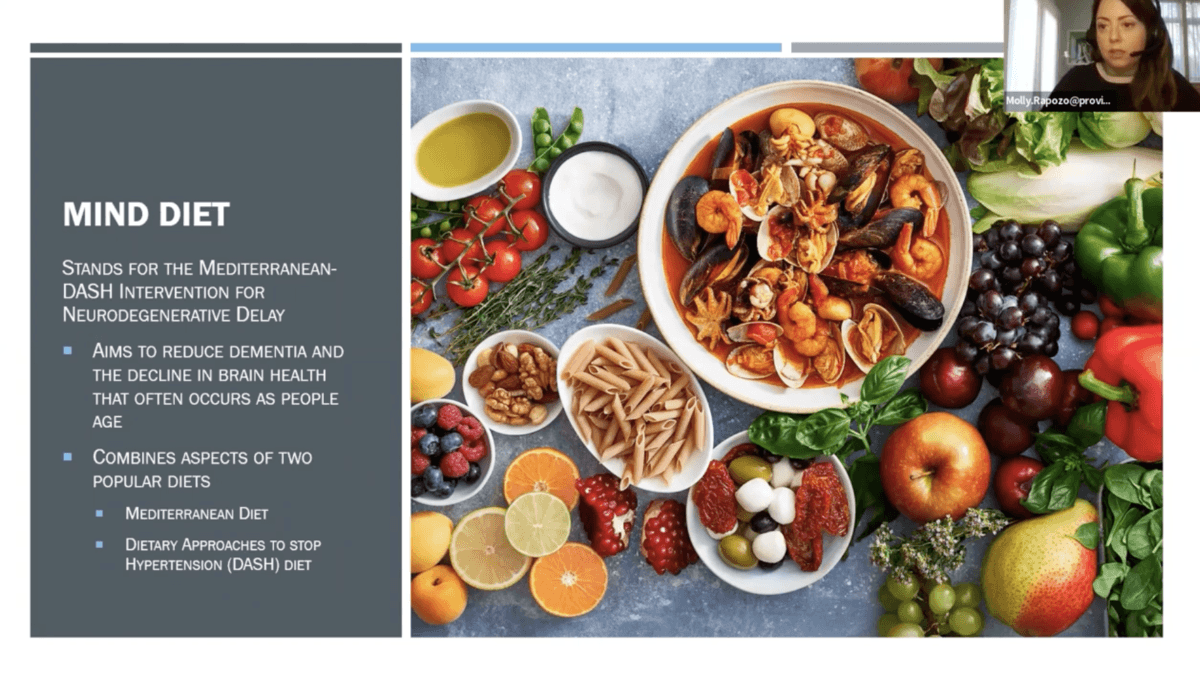 13. Everything Parkinson’s: Brain Boosting Foods for Parkinson’s Disease with Molly Rapozo, MS, RDN
Everything Parkinson’s Webinars: https://www.pacificneuroscienceinstit… Molly Rapozo, MS, RDN, CD, a registered Dietician Nutritionist and Brain Health Coach at the Pacific Brain Health Center, discusses nutrition and food in relation to…
13. Everything Parkinson’s: Brain Boosting Foods for Parkinson’s Disease with Molly Rapozo, MS, RDN
Everything Parkinson’s Webinars: https://www.pacificneuroscienceinstit… Molly Rapozo, MS, RDN, CD, a registered Dietician Nutritionist and Brain Health Coach at the Pacific Brain Health Center, discusses nutrition and food in relation to…

Lifestyle Program at PNI

Why You Should Eat Tomatoes in September
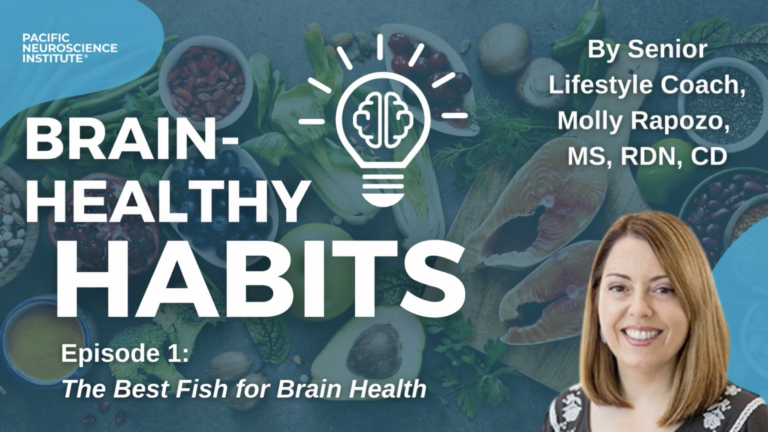
Brain-Healthy Habits Episode 1: The Best Fish for Brain Health
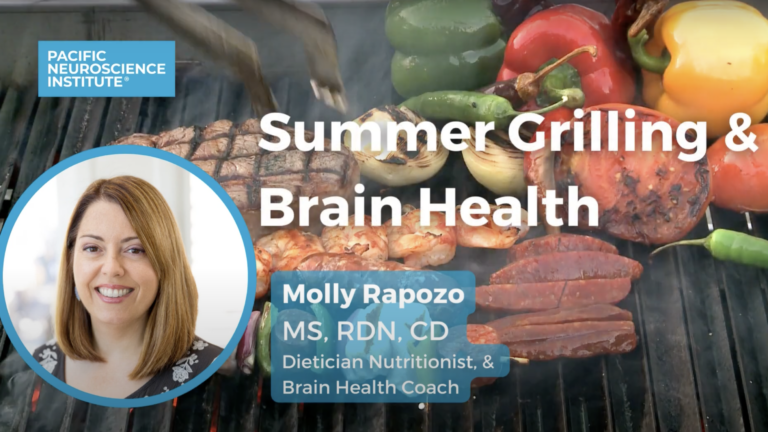
Summer Grilling and Brain Health. What are AGEs? with Molly Rapozo | A PNI Minute

A PNI Minute | The MIND Diet for Parkinson’s Disease
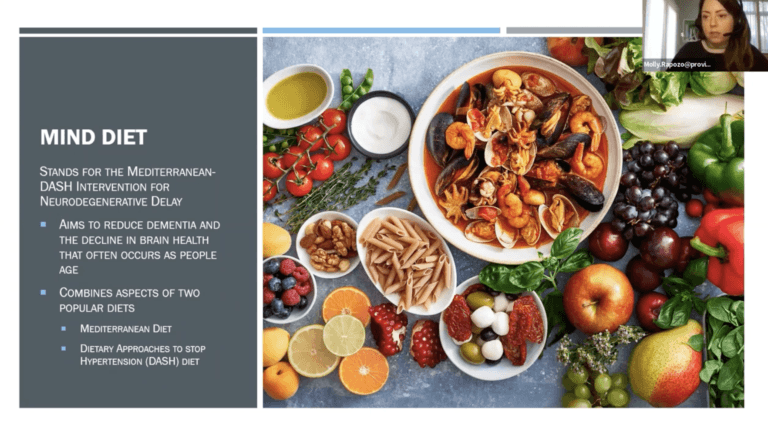
13. Everything Parkinson’s: Brain Boosting Foods for Parkinson’s Disease with Molly Rapozo, MS, RDN
Related Articles
About the Author

Jennifer Bramen
Jennifer Bramen, PhD, is a Senior Research Scientist at the Pacific Neuroscience Institute Foundation. She works alongside clinician-scientists at the Pacific Brain Health Center to bridge the gap between the translational research pipeline and full clinical implementation. Dr. Bramen is also spearheading the Pacific Neuroscience Institute Foundation’s Neuroimaging Core, which provides neuroimaging-based biomarkers for clinical trials research.
Last updated: April 23rd, 2024


